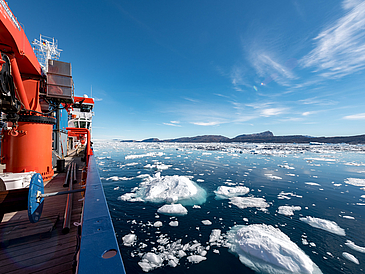Leading experts from various areas of German polar and ocean research have now submitted the so-called MARE:N concept paper. Members of the University of Bremen actively participated in the coordination and formulation of the concept paper – dedicated work that is fitting with the image of the Bremen university as a strong and committed climate university. In 15 chapters, the paper recommends which areas in polar and ocean research should receive particular focus in the coming years.
The BMBF will take on the recommendations in a short space of time and will fund corresponding research projects. Yearly, three million euros will be available for the realization of the projects. Additionally, the ministry will invest a further ten million euros until 2025 for the accelerated analysis of data from the MOSAiC expedition. Polar research will also play a significant role in the United Nations Decade of Ocean Science for Sustainable Development that will start in June.
University of Bremen Played Leading Role in MARE:N
Scientists from the University of Bremen played a leading role in the paper. Professor Monika Rhein from the Institute for Environmental Physics (IUP) and MARUM – Center for Marine Environmental Sciences is one of the two chairpersons of the accompanying scientific board that created the “Polarregionen im Wandel” paper. As a member of the accompanying scientific board, Professor Wilhelm Hagen (marine zoology, BreMarE – Bremen Marine Ecology) is head of one of the eight research fields (“Ökosysteme in den Polarmeeren unter Klimastress”). One of the most important issues is, according to Hagen, how climate change influences polar food webs and their role in the global carbon cycle.
“The concept paper thrives on the expertise of more than 100 authors from the natural, social, and political sciences, that are located at 24 different institutions,” explains Monika Rhein. “The chosen research topics, which are relevant to society, mark high-performing and internationally visible areas of German polar research.” The Bremen researcher is also the chairperson of the SCAR/IASC National Committee, which was founded by the German Research Foundation (DFG). Wilhelm Hagen and Dr. Gunnar Spreen (also from the Institute for Environmental Physics) are also committee members from the University of Bremen. Together with the Alfred Wegener Institute, Helmholtz Centre for Polar and Marine Research (AWI) in Bremerhaven, the National Committee coordinates German university-based polar research and the contact to involved national authorities. It also names the delegates for the two most important international polar science organizations – SCAR (Scientific Committee on Antarctic Research) and IASC (International Arctic Science Committee). There are currently more than 70 German researchers who actively work as part of SCAR and IASC.
Karliczek: “Global Warming Is Changing Polar Regions Rapidly”
Federal Minister for Research Anja Karliczek explained the decision to provide the additional 20 million euros in research funding for polar research: “The polar regions are changing rapidly due to global warming. The effects can be felt across the world. They influence the climate of the entire Northern Hemisphere and contribute to extreme weather occurrences and a rise in sea level. The most recent news from the polar regions was not good. It is deeply worrying that the ice in Greenland is melting quicker than thought, for example.”
That is why it is correct that Germany and the EU become more ambitious in terms of climate protection. “We will also require scientific findings in the future in order to continually assess the efficacy and suitability of the worldwide climate protection measures. That is why Germany is taking on global responsibility in the field of climate research. For me, the ‘Polarregionen im Wandel’ concept paper is a guide that guarantees that our project funding will indeed address the truly relevant issues. We will invest an additional 20 million euros in polar research by 2025 for this,” states the minister.
The Background:
The research project “MARE:N - Küsten-, Meeres- und Polarforschung für Nachhaltigkeit“ is made up of the three areas of coastal, marine, and polar research. It forms the program framework that is specified in these three areas by means of the agenda process results.
Experts thus become significant initiators. The concept papers provide the content-related foundations for three to four funding announcements and therefore also the support for a period of five to eight years. In this way, the funding is directed towards current research-political and societal issues. With these processes, the path is cleared for future research funding by the BMBF in the field of coastal, marine, and polar research.
Two agenda processes were successfully completed by interdisciplinary expert circles in 2019 and the results were published in the MARE:N concept papers “Küste im Wandel” and “Blauer Ozean.” The topic focus areas and research needs of polar research are now the center of attention in a third agenda process.
The agenda process “Polarregionen im Wandel” started with the consultation of two circles of experts – Arktisdialog and the German National Committee for Polar Research (SCAR/IASC). The consultation processes within the specialist bodies led to first interdisciplinary topics being found, as well as the appointment of chairpersons and members in June 2020. Under the lead of Professor Monika Rhein and Professor Thomas Jung (AWI), a group of renowned polar researchers developed the available concept paper. The paper organized the future research needs into eight research areas relevant to society, with a supplement of two cross-sectional topics and the required research surroundings.
The concept paper “Polarregionen im Wandel” from the MARE:N accompanying circle enables the national government to realize the research needs formulated by the scientific sector for the coming political processes on a national, European, and international level.
Further Information:
www.fona.de/medien/pdf/Forschungsagenda_Polarregionen_Konzeptpapier_des_MAREN_Begleitkreises_Mai_2021.pdf (in German only)
https://www.ocean.uni-bremen.de/eng/
www.uni-bremen.de/en/
Contact:
Prof. Dr. Monika Rhein
University of Bremen
Institute for Environmental Physics (IUP)
MARUM – Center for Marine Environmental Sciences
Phone: +49 421 218 62160
Email: mrheinprotect me ?!uni-bremenprotect me ?!.de

